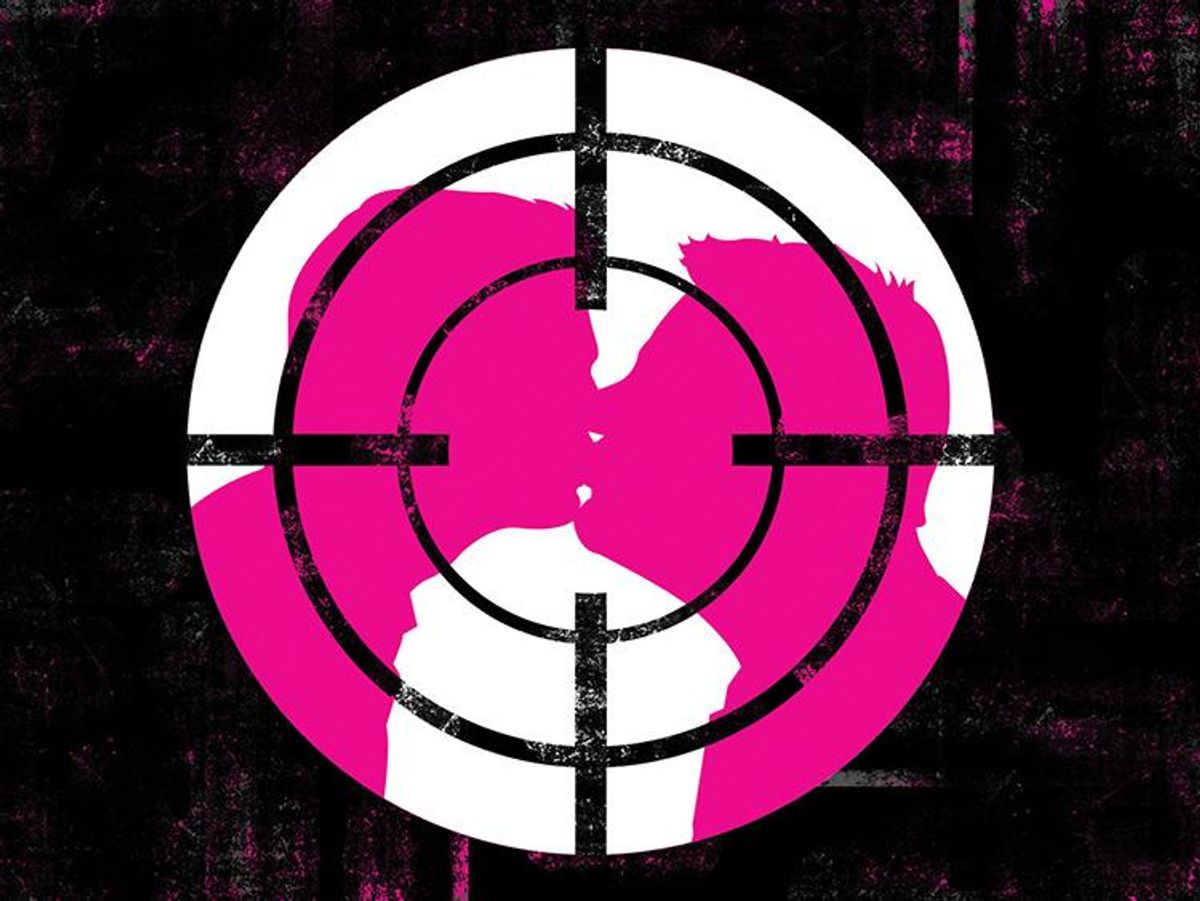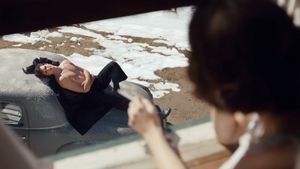Illustration by Taylor Callery.
On June 12, 2016, a deranged homophobe used a legally purchased semiautomatic weapon to slaughter 49 people at an LGBT nightclub in Orlando -- and two movements were suddenly, tragically fused together. LGBT people in America have, of course, always known that we're a vulnerable community: We are, after all, disproportionately victimized by hate crimes, partly as a result of our constant vilification at the hands of conservative politicians. But the Orlando shooting made an abstract fear horrifyingly concrete. Like those 49 people who perished in the Pulse nightclub, we all seemed to realize that day that our lives could be ended in an instant by a bigot's bullets.
Within a week, every major American LGBT rights organization had adopted a platform to stop gun violence. Several joined forces with established gun control groups. A new campaign, Gays Against Guns, came together in hours and immediately asserted itself as the spiritual successor to early AIDS protesters. But amidst the organizing and sloganeering, a lingering question remains: Can LGBT people add some new, critical element to the fight against runaway gun violence in the United States? Or are we simply adding our voices to a deafening clamor that, for all its sound and fury, has repeatedly failed to effect any real reforms?
Anyone who walked by the Human Rights Campaign's headquarters in the days following the massacre knows that LGBT groups can certainly amplify calls for gun reform: The organization placed large photographs of each victim in its windows, a display of solidarity and a somber reminder that most of the Pulse victims were queer Latinx youth. The HRC also passed a resolution calling for "common-sense gun safety reform," explaining that "LGBTQ people have [long] been a target for bias-motivated violence, and easy access to deadly weapons has compounded this threat."
But even a cash-flush advocacy powerhouse like the HRC has to pick its battles, and the organization's resources are increasingly consumed by the viciously anti-LGBT bills currently flooding state legislatures. The HRC presents a compelling case for adopting gun control as an LGBT issue: More than 20 percent of hate crimes reported to the FBI in 2014 targeted people based on their sexual orientation or gender identity (a low estimate), meaning LGBT people are disproportionately likely to be the victims of bias-motivated violence. Many of these attacks are committed with firearms. The HRC fails, however, to explain how its tried-and-true advocacy methods would prove especially helpful in the realm of gun violence. Yes, #LoveConquersHate, and an army of lawyers was enough to win marriage equality at the Supreme Court. But are they really effective tools in a battle with the NRA?
Gays Against Guns offers a different approach. Whereas the HRC is polite and composed, GAG is loud, rude, and righteously pissed. (The group's actions are often co-sponsored by Queer Nation, another rowdy activist group.) Coming together shortly after the Pulse shooting, GAG was the brainchild of John Grauwiler, Kevin Hertzog, and Brian Worth, who, furious with the futility of previous gun-control campaigns, borrowed the protest strategies of ACT UP, the anti-AIDS advocacy group that deployed guerrilla protests and political theater to great effect in the '80s and '90s. One roadblock to gun reform is lack of interest, as the cycle has become morbidly predictable: A shooting occurs; Democrats demand legislative action; Republicans crush all hope of success; then interest wanes until the next massacre. By borrowing from ACT UP's flamboyant tactics -- especially its noisy protests in very public places -- GAG hopes to keep the focus on gun violence, its victims, and its enablers.
"So many of us in Gays Against Guns are ACT UP babies," Grauwiler told me, "and we saw the effect of political theater and direct action firsthand. When you bring your protest to the streets -- when you're out there committing civil disobedience -- I think that resonates for people more than signing a petition online. In-your-face political theater sends a clear message that we are fed up. It says, 'I have taken a stand. I am telling you through my action, I am expressing my dismay, my concern, my fear, my outrage.' And that resonates."
Tim Murphy, one of GAG's first members, explained that ACT UP perfected the art of "shaming and discomforting their targets."
"Even in this social media age," he said, "you can't quite throw the spotlight on a target in the same way. There's something so visceral about the way that ACT UP agitated that still feels very powerful. You can't deny the power of bodies nonviolently disrupting business as usual in a public space."
To keep the spotlight on "the chain of death of the gun lobby," as Murphy puts it, GAG is planning a "shame, name, and blame" puppet campaign this fall, protesting politicians who take money from the NRA. (The demonstrations will involve actual
puppets.) GAG chapters have cropped up in at least a dozen major cities, and the group received a publicity boost after it participated in the New York City Pride parade. Roughly 750 people showed up to don the GAG banner and participate in "die-ins" on the parade route, one of several GAG has already staged. (Another took place outside Trump Tower.) And the group borrows its organizing tactics from the marriage equality movement's 50-state strategy: GAG plans to build support in every corner of the country, so members can protest on short notice whenever a politician blocks a reasonable gun-control measure.
If GAG has mastered ACT UP-style theater, it hasn't yet perfected HRC-style messaging. Its founding members agree that GAG supports stricter background checks and an assault weapons ban; beyond that, the details are hazy. The group initially supported Democrats' proposal to forbid those on the terrorist watch list from buying firearms, but it backed away from the measure after progressive critics deemed it a threat to civil liberties. (In addition to being notoriously unreliable, the watch list often unfairly targets Muslim citizens.) There are, no doubt, growing pains -- but GAG's ability to draw headlines, especially in what can macabrely be described as the lull between mass shootings, has already proved to be an asset.
Thus far, the group has been careful to respect and partner with more-established voices in the fight for gun control. But the GAG members I spoke with really do believe that, as LGBT Americans, they offer something unique to the movement -- something the movement needs, after Pulse, after the queer community awoke on June 12 to a grisly reminder of its vulnerability in a country awash with guns.
"I was a member of Queer Nation and ACT UP," Ken Kidd, an early GAG member, told me. "We're those folks who suit up and show up as soon as we're targeted. You get one of us, you get all of us. People wouldn't lobby on our behalf for a hate-crime bill, so we did it ourselves. People wouldn't fight to get HIV medications into the pipeline, so we did it ourselves. They wouldn't fight for equal marriage, so we did it ourselves."
Kidd paused.
"As LGBT people, we're used to hearing about something and going into action," he continued. "And that's what Gays Against Guns is going to do now."


















































































